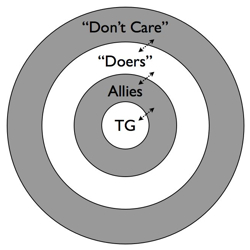Rather than simply report on each of the sessions of the recent Transgender Religious Summit, I’ve chosen instead to discuss dominant themes that emerged from the conference as a whole. Today, I’ll address relational education.
Transgender people of faith and their allies must provide more and better education to the church at large if we hope to stimulate denominational policy makers to affirming change. This theme emerged in the Summit’s introductory session, led by Dr. Joel Kushner, Director of the Institute for Judaism and Sexual Orientation at Hebrew Union College-Jewish Institute of Religion in Los Angeles, and Barbara Satin, transgender activist and consultant with the Institute for Welcoming Resources. As Barbara noted, even lesbian, gay, and bisexual people frequently lack the information they need to be effective allies to transgendered people, and denominations that welcome and affirm us in theory (or in theology)  often struggle to do so effectively in practice. Education narrows the gap between theory and practice, and does so best when it occurs within the context of relationships marked by trust. Trying to create change outside of healthy relationships frequently leads to conflict.
often struggle to do so effectively in practice. Education narrows the gap between theory and practice, and does so best when it occurs within the context of relationships marked by trust. Trying to create change outside of healthy relationships frequently leads to conflict.
Unitarian Universalists Mr. Barb Greve (of the Unitarian Universalist Association of Congregations‘ Office of Bisexual, Lesbian, Gay, and Transgender Concerns) and Rev. Sean Parker Dennison (minister of South Valley UU Fellowship in Salt Lake City, Utah), leading a session on policy changes in the UUA affirming of transgender clergy, suggested a multi-layered model for the environment in which we build these kinds of healthy relationships.

Moving outward from the transgender community in the center we have our allies; “doers” with whom we have no direct relationships but who are able (and possibly willing) to take concrete action on our behalf; and those who “don’t care” about our issues enough to work for change. Barb and Sean noted that the quality of our educative communication decreases with distance from the center. The key, therefore, is getting allies and “doers” to advocate on our behalf throughout the organization. They offered this outline of a strategy for doing so:
- Consider who in your organization falls in each category; put names in each circle.
- Consider the relationships between these people. What connections already exist, formal and informal?
- Intentionally connect people in adjacent circles with one another. Note this is asks some to move toward the margins of the organization, which often generates anxiety.
- As relationships allow, proactively suggest ways allies can advocate to doers and doers can advocate to those who don’t care.
- Think about how to move people inward. Education aids this process.
- This process must be continually repeated as relationships grow and change, staff rotate into new positions, new staff come on, etc.
Barb and Sean also suggested forming a transgender “caucus,” an identity-based advocacy group within the larger organization, as a way of building those relationships. A caucus provides “a place you can go” to receive personal support and formulate group strategy and, when managed carefully, can help protect the unity of an organization’s transgender community.
(More on the theme of relational education in my next post.)
Hey Allison,
Wonderful blog and glad to have more trans/religious voices out there. One quick correction: Barb no longer works for the OBGLTC. He is now Interim Director of Religious Education at the Unitarian Society of New Haven, CT.